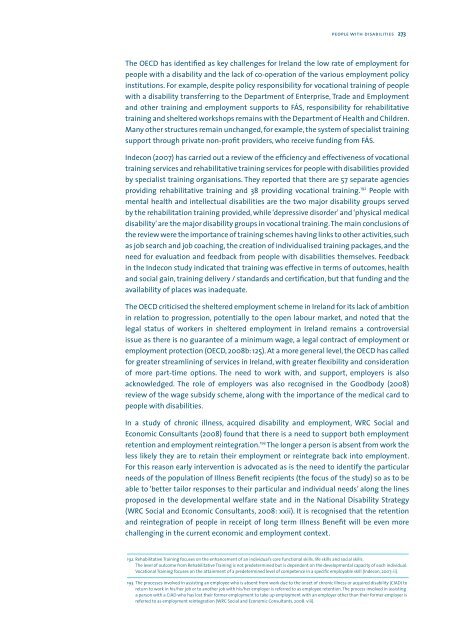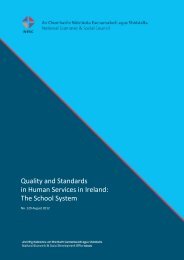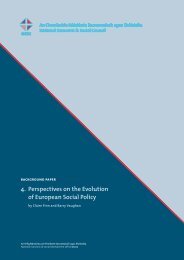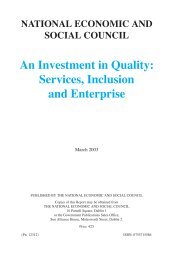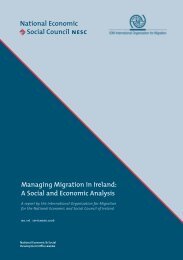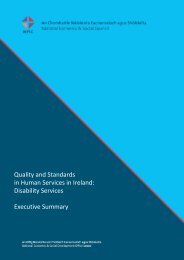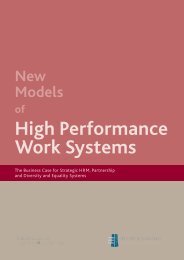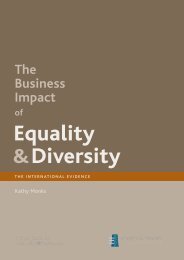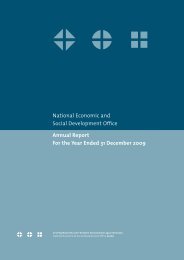A Social Report for Ireland Volume II - the NESC Website
A Social Report for Ireland Volume II - the NESC Website
A Social Report for Ireland Volume II - the NESC Website
You also want an ePaper? Increase the reach of your titles
YUMPU automatically turns print PDFs into web optimized ePapers that Google loves.
people with disabilities 273The OECD has identified as key challenges <strong>for</strong> <strong>Ireland</strong> <strong>the</strong> low rate of employment <strong>for</strong>people with a disability and <strong>the</strong> lack of co-operation of <strong>the</strong> various employment policyinstitutions. For example, despite policy responsibility <strong>for</strong> vocational training of peoplewith a disability transferring to <strong>the</strong> Department of Enterprise, Trade and Employmentand o<strong>the</strong>r training and employment supports to FÁS, responsibility <strong>for</strong> rehabilitativetraining and sheltered workshops remains with <strong>the</strong> Department of Health and Children.Many o<strong>the</strong>r structures remain unchanged, <strong>for</strong> example, <strong>the</strong> system of specialist trainingsupport through private non-profit providers, who receive funding from FÁS.Indecon (2007) has carried out a review of <strong>the</strong> efficiency and effectiveness of vocationaltraining services and rehabilitative training services <strong>for</strong> people with disabilities providedby specialist training organisations. They reported that <strong>the</strong>re are 57 separate agenciesproviding rehabilitative training and 38 providing vocational training. 192 People withmental health and intellectual disabilities are <strong>the</strong> two major disability groups servedby <strong>the</strong> rehabilitation training provided, while ‘depressive disorder’ and ‘physical medicaldisability’ are <strong>the</strong> major disability groups in vocational training. The main conclusions of<strong>the</strong> review were <strong>the</strong> importance of training schemes having links to o<strong>the</strong>r activities, suchas job search and job coaching, <strong>the</strong> creation of individualised training packages, and <strong>the</strong>need <strong>for</strong> evaluation and feedback from people with disabilities <strong>the</strong>mselves. Feedbackin <strong>the</strong> Indecon study indicated that training was effective in terms of outcomes, healthand social gain, training delivery / standards and certification, but that funding and <strong>the</strong>availability of places was inadequate.The OECD criticised <strong>the</strong> sheltered employment scheme in <strong>Ireland</strong> <strong>for</strong> its lack of ambitionin relation to progression, potentially to <strong>the</strong> open labour market, and noted that <strong>the</strong>legal status of workers in sheltered employment in <strong>Ireland</strong> remains a controversialissue as <strong>the</strong>re is no guarantee of a minimum wage, a legal contract of employment oremployment protection (OECD, 2008b: 125). At a more general level, <strong>the</strong> OECD has called<strong>for</strong> greater streamlining of services in <strong>Ireland</strong>, with greater flexibility and considerationof more part-time options. The need to work with, and support, employers is alsoacknowledged. The role of employers was also recognised in <strong>the</strong> Goodbody (2008)review of <strong>the</strong> wage subsidy scheme, along with <strong>the</strong> importance of <strong>the</strong> medical card topeople with disabilities.In a study of chronic illness, acquired disability and employment, WRC <strong>Social</strong> andEconomic Consultants (2008) found that <strong>the</strong>re is a need to support both employmentretention and employment reintegration. 193 The longer a person is absent from work <strong>the</strong>less likely <strong>the</strong>y are to retain <strong>the</strong>ir employment or reintegrate back into employment.For this reason early intervention is advocated as is <strong>the</strong> need to identify <strong>the</strong> particularneeds of <strong>the</strong> population of Illness Benefit recipients (<strong>the</strong> focus of <strong>the</strong> study) so as to beable to ‘better tailor responses to <strong>the</strong>ir particular and individual needs’ along <strong>the</strong> linesproposed in <strong>the</strong> developmental welfare state and in <strong>the</strong> National Disability Strategy(WRC <strong>Social</strong> and Economic Consultants, 2008: xxii). It is recognised that <strong>the</strong> retentionand reintegration of people in receipt of long term Illness Benefit will be even morechallenging in <strong>the</strong> current economic and employment context.192. Rehabilitative Training focuses on <strong>the</strong> enhancement of an individual’s core functional skills, life skills and social skills.The level of outcome from Rehabilitative Training is not predetermined but is dependent on <strong>the</strong> developmental capacity of each individual.Vocational Training focuses on <strong>the</strong> attainment of a predetermined level of competence in a specific employable skill (Indecon, 2007: ii).193. The processes involved in assisting an employee who is absent from work due to <strong>the</strong> onset of chronic illness or acquired disability (CIAD) toreturn to work in his/her job or to ano<strong>the</strong>r job with his/her employer is referred to as employee retention. The process involved in assistinga person with a CIAD who has lost <strong>the</strong>ir <strong>for</strong>mer employment to take up employment with an employer o<strong>the</strong>r than <strong>the</strong>ir <strong>for</strong>mer employer isreferred to as employment reintegration (WRC <strong>Social</strong> and Economic Consultants, 2008: viii).


